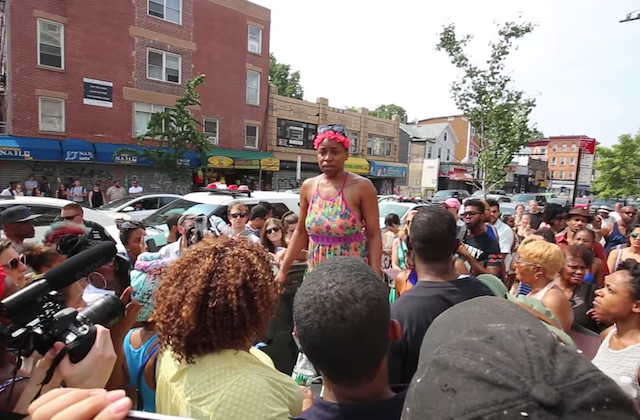Dozens of residents from Brooklyn’s gentrifying Crown Heights neighborhood greeted a restaurant—whose White owner advertised a bullet hole-strewn decor and 40 oz rosé bottles in paper bags—with protests and demands for a change in business practices on Saturday (July 22).
Gothamist reported yesterday (July 23) that residents gathered outside the Summerhill restaurant to protest owner Becca Brennan’s marketing, which earned criticism for its tone-deaf use of Black poverty stereotypes. Gothamist adds that the action emerged in specific response to a press release, published by Eater New York today (July 24), that Brennan emailed to media last Monday (July 17). The release references the building’s origins as a bodega "with a rumored backroom illegal gun shop," original "bullet hole-ridden wall" (which an earlier Gothamist report confirmed to be unverified) and a variety of craft cocktails and beers. Gothamist also reports that Brennan encountered additional accusations of racism and classism for promotions that featured a picture of a $12 cocktail in front of the aforementioned wall and plans to sell 40 oz rosé bottles—the same size as inexpensive malt liquor bottles marketed to low-income Black communities—in paper bags. Eater New York notes that Brennan is a White former corporate tax attorney and transplant from Toronto.
Gothamist’s video above shows an unidentified Black woman admonishing Brennan and the restaurant, which remained open throughout the action, for drawing on negative stereotypes that grew out of poverty and violence:
Don’t tie something to our culture, half of that shit was pushed on us. We don’t own no motherfucking planes, and most of us ain’t been business owners long enough to create no motherfucking 40. That shit was pushed here, and we fought through all of that shit. Still fighting. We’re the motherfucking trendsetters. You ain’t going to take some motherfucking pain, this is real pain, you’re not going to take our pain and make it a novelty.
"People of color are not props or backdrops," Toya Lillard, a Black Crown Heights denizen, told Gothamist. "If you are new to this community, you are duty bound to do some research. To be culturally literate. To know where you are. To know what came before you. It’s not our job to inform you or educate you. It’s yours."
Gothamist says that one Black Summerhill employee spoke to the crowd, referencing the White protestors among them as "the gentrifiers going off on a gentrifier." He stopped after several protestors shouted over him.
Participants presented a list of demands to Brennan, who reportedly tended bar during the action, that organizer Justine Stephens later published in the Facebook post below. The demands include: a public apology from Brennan, a business plan that specifies how Summerhill will employ Crown Heights residents and people of color at living or better wages, the removal of the fake bullet wall and affordable or pro bono use of the restaurant’s facilities for community events.
Brennan apologized for the press release in remarks to Gothamist last Wednesday (July 19). "I truly never meant [to trivialize gun violence], but I recognize that it was insensitive," she said. "I was excited to keep the wall as a shout out to the different businesses that occupied the space before us, but my intention was misinterpreted and I’m sorry for that." People identified by Gothamist as her publicists passed out copies of a similar statement to the protestors. It included the following: "I recognize that I have more work to do to continue healing relationships with my neighbors."
As for where things stand, Stephens told Gothamist that she spoke to the publicists and discussed plans for an additional meeting to address the demands. "We’ll work with you to help you," she said "But at this point, it’s on [Brennan]."
The outrage towards Summerhill reflects the tension surrounding gentrification in Crown Heights and other predominantly Black New York City neighborhoods. A DNAInfo report from January notes that the 11216 area code, which includes parts of Crown Heights and nearby Bedford-Stuyvesant, noted a major, but unspecified, increase in its percentage of households earning more than $150,000 per year between 2011 and 2015.
